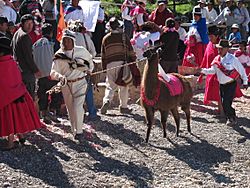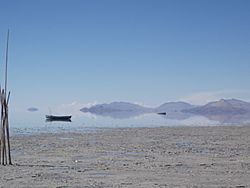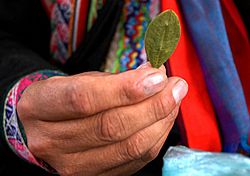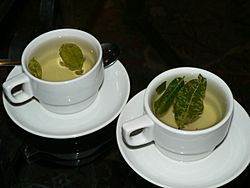Evo Morales facts for kids
Quick facts for kids
Evo Morales
|
|
|---|---|
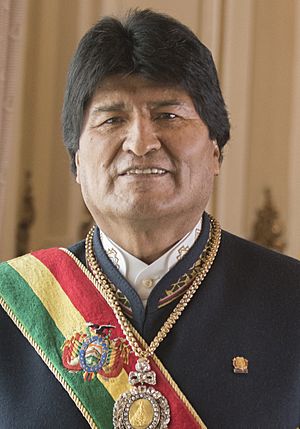
Official portrait, 2018
|
|
| 65th President of Bolivia | |
| In office 22 January 2006 – 10 November 2019 |
|
| Vice President | Álvaro García Linera |
| Preceded by | Eduardo Rodríguez Veltzé |
| Succeeded by | Jeanine Áñez |
| President pro tempore of CELAC | |
| In office 14 January 2019 – 10 November 2019 |
|
| Preceded by | Salvador Sánchez Cerén |
| Succeeded by | Jeanine Áñez |
| President pro tempore of UNASUR | |
| In role 17 April 2018 – 16 April 2019 |
|
| Preceded by | Mauricio Macri |
| Succeeded by | Vacant |
| President of the Movement for Socialism | |
| In office 1 January 1998 – 13 November 2024 |
|
| Preceded by | Party established |
| Succeeded by | Grover García |
| Member of the Chamber of Deputies for Cochabamba circumscription 27 |
|
| In office 2 August 2002 – 22 January 2006 |
|
| Alternate | Luis Cutipa |
| Succeeded by | Asterio Villarroel |
| In office 6 August 1997 – 24 January 2002 |
|
| Alternate | Valentín Gutiérrez |
| Preceded by | Seat established |
| Personal details | |
| Born |
Juan Evo Morales Ayma
26 October 1959 Isallavi, Bolivia |
| Political party | EVO Pueblo (since 2025) |
| Other political affiliations |
Movement for Socialism (1997–2025) Front for Victory (February 21, 2025–April 9, 2025) |
| Children | 2 |
| Parents |
|
| Relatives | Esther Morales (sister) |
| Signature |  |
| Military service | |
| Allegiance | Bolivia |
| Branch/service | Bolivian Army |
| Years of service | 1977–1978 |
| Unit | Fourth Ingavi Cavalry Regiment |
Juan Evo Morales Ayma (born 26 October 1959) is a Bolivian politician and activist. He served as the 65th president of Bolivia from 2006 to 2019. He was the country's first president from its indigenous population. His government focused on helping Bolivia's indigenous people and fighting poverty.
As a socialist, Morales led the Movement for Socialism (MAS) party. He worked to give the government more control over Bolivia's natural resources, like gas. He also worked to reduce the influence of the United States in his country.
Morales was born into a poor Aymara family of farmers. As a young man, he became a coca farmer and a leader in the farmers' union. He campaigned to protect the coca leaf, which is a traditional plant in Andean culture. This work made him a well-known activist. He was elected to Bolivia's Congress in 1997.
He ran for president and won in 2005. As president, he used money from the gas industry to pay for social programs. These programs helped improve education and reduce poverty. His government also passed a new constitution that recognized Bolivia as a plurinational state, honoring its many indigenous groups.
Morales was re-elected in 2009 and 2014. His popularity went down when he tried to remove the rule that limited how many times a president could be elected. After the 2019 election, there were large protests because people disagreed with the results. To avoid more conflict, Morales resigned from office. He returned to Bolivia in 2020 after his party's new candidate, Luis Arce, was elected president.
Supporters praise Morales for fighting for indigenous rights and reducing poverty. They also point to the country's economic growth during his time in office. Critics say he weakened democracy by trying to stay in power for too long.
Contents
Early Life and Activism
Childhood and Education
Morales was born on 26 October 1959, in Isallawi, a small village in western Bolivia. He was born into an Aymara family. Out of seven children, only he and his two siblings, Esther and Hugo, survived childhood. His family were subsistence farmers, meaning they grew just enough food to live on.
From a young age, Evo helped his family with farming and herding llamas. He loved to play soccer and even made his own soccer ball. He went to a small primary school in his village. When he was six, he spent time in Argentina with his father and sister, where he sold ice cream.
After primary school, he attended a technical high school. To earn money, he worked as a brick-maker, a baker, and a trumpet player in a band. This allowed him to travel around Bolivia. After finishing his studies, he completed his mandatory military service in the Bolivian Army from 1977 to 1978.
Becoming a Farmers' Leader
After his military service, Morales moved with his family to the Chapare region. They started a farm where they grew rice, fruit, and coca. The coca leaf is a traditional plant in the Andes mountains. It is used in ceremonies and as a medicine, often brewed as a tea.
In Chapare, Morales joined the coca growers' union, known as cocaleros. He became a leader, organizing soccer tournaments for the union members. He became active in protesting against the government's efforts to destroy coca farms. The government was under pressure from the United States to stop coca farming.
Morales and other farmers believed that growing coca was their right and part of their culture. They saw the government's actions as a violation of their traditions and a threat to their way of life. Morales led many protests, including marches and roadblocks, to defend the coca farmers.
In 1988, he was elected as the Executive Secretary of a large federation of coca growers. He traveled to other countries to speak about the cocalero cause. He argued that the coca leaf was a symbol of Andean culture and should be protected.
Rise in Politics
Creating a Political Party
In the 1990s, Morales and other union leaders decided to enter politics. They formed a political group to represent the interests of farmers and indigenous people. This group eventually became the Movement for Socialism, or MAS.
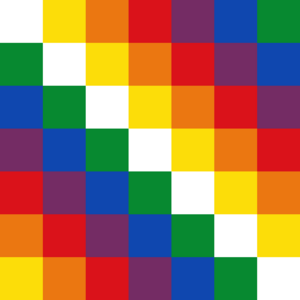
In 1997, Morales was elected to the National Congress of Bolivia. He represented the Chapare region, where he won with over 70% of the vote. In Congress, he continued to speak out against the government's policies.
The MAS party grew in popularity. It was different from other parties because it was run by its members, who were mostly from social movements. The party did not have a lot of money, so it relied on volunteers. In the 1999 local elections, MAS won many positions in city councils and as mayors.
Gaining National Attention
In 2000, major protests broke out in the city of Cochabamba. This was called the "Water War" because people were protesting against a private company that had doubled the price of water. Morales and the MAS supported the protesters. The government eventually canceled the company's contract.
These protests, along with others like the "Gas War" in 2003, made Morales a national figure. He became the voice for many poor and indigenous Bolivians who felt ignored by the government.
In 2002, Morales ran for president for the first time. Just before the election, the U.S. ambassador said that if Morales won, the U.S. would cut aid to Bolivia. This statement backfired and actually increased support for Morales. He came in a close second place, which made him the leader of the opposition in Bolivia.
Presidency (2006–2019)
In the December 2005 election, Morales won the presidency with nearly 54% of the vote. It was a historic victory. He became Bolivia's first-ever indigenous president. People across Latin America, especially indigenous groups, celebrated his election.
His inauguration on 22 January 2006 was a major event. He wore a special suit with Andean designs. In his speech, he promised to "refound" Bolivia and end the "colonial" systems of the past.
First Term (2006–2009)
Economic Changes
One of Morales's first actions was to take more control of Bolivia's valuable natural gas industry. He changed the law so that the government received 82% of the profits from gas companies, up from just 18%. This brought a lot of money to the country.
With this new income, his government increased spending on social programs. They started projects to fight poverty, improve literacy, and build new roads and schools, especially in rural areas. The economy grew stronger, and for the first time in 30 years, the government did not have a deficit.
A New Constitution
Morales's government called for a new constitution. An assembly was elected in 2006 to write it. The new constitution, approved in a referendum in 2009, made big changes.
- It renamed the country the Plurinational State of Bolivia to recognize the 36 different indigenous nations within it.
- It gave more rights to indigenous people and made their languages official.
- It gave the state more control over natural resources.
- It set a limit of two terms for any president.
This process caused tension. Some of Bolivia's wealthier eastern regions, known as the Media Luna, wanted more autonomy, or self-rule. This led to protests and clashes. However, Morales was supported by a majority of Bolivians in a special vote in 2008, and the new constitution was passed.
Second Term (2009–2014)
Morales won the 2009 election with a large majority of 64%. During his second term, his government continued its social programs.
- A program called Bono Juancito Pinto gave money to parents to keep their children in school.
- The Renta Dignidad program gave a small pension to all older Bolivians.
- The government also expanded healthcare and built new hospitals.
However, his government also faced protests. In 2011, there were major protests against a plan to build a highway through the TIPNIS, a protected rainforest and indigenous territory. Environmentalists and indigenous groups said the road would harm the environment and their communities. After the protests, Morales agreed to stop the project.
Third Term (2014–2019)
The 2009 constitution allowed a president to serve for only two terms. However, in 2013, a court ruled that Morales's first term did not count because it happened before the new constitution. This ruling was controversial but allowed him to run again.
Morales won the 2014 election with over 61% of the vote. During this term, he became Bolivia's longest-serving president. His government continued to focus on social spending and infrastructure projects.
In 2018, he opened a new 29-story presidential office building called the Casa Grande del Pueblo ("Great House of the People"). Critics said the building was too expensive and luxurious for a poor country. Morales defended it, saying it was a symbol of a new Bolivia and would save money by housing many government offices in one place.
Resignation in 2019
In 2016, Morales held a referendum to ask voters if he could change the constitution to run for a fourth term. The voters said no. However, in 2017, the constitutional court ruled that term limits violated his human rights, allowing him to run in the 2019 election.
The 2019 election was very close. When the official count showed Morales winning, his opponents claimed the election was unfair. This led to weeks of massive protests across Bolivia. The situation became very tense.
The head of the army suggested that Morales should resign to help restore peace. On 10 November 2019, Morales announced his resignation, saying he was doing it to stop the violence. He then flew to Mexico, which had offered him political asylum. He later moved to Argentina.
Post-Presidency
After Morales resigned, an interim government took over in Bolivia. A new election was held in 2020. The winner was Luis Arce, the candidate from Morales's own MAS party.
One day after Arce took office, Morales returned to Bolivia in November 2020. He remains an important figure in his party, but his relationship with President Arce has had some disagreements. He continues to be active in politics and is the head of the six coca-grower federations in the Chapare region.
Political Ideas
Morales is a socialist. He believes in what he calls "communitarian socialism," which is inspired by the community values of Andean indigenous cultures. His main goals have been to fight imperialism (the influence of powerful countries like the U.S.) and neoliberalism (policies that favor private companies over the state).
His government created a mixed economy, where some industries are state-owned while others are private. He believes the state should control key resources like natural gas to use the profits for the good of all citizens. He has focused on empowering indigenous people and the poor, who he calls "the people," against what he sees as a small, wealthy elite.
Personal Life
Morales is proud of his Aymara heritage. He is known for his simple and direct style. When he first became president, he often wore a striped alpaca sweater instead of a formal suit. This sweater became a famous symbol of his connection to his culture.
Morales is not married. When he was president, his older sister, Esther Morales, served as the First Lady. He has two children, a daughter named Evaliz and a son named Álvaro. He is a huge fan of association football and often plays in local games.
Legacy
Evo Morales is one of the most important figures in Bolivian history. His presidency marked a turning point for the country, especially for its indigenous majority.
Achievements:
- Poverty Reduction: During his time in office, poverty in Bolivia was reduced by 42%, and extreme poverty fell by 60%.
- Economic Growth: Bolivia's economy grew steadily, and the government invested heavily in infrastructure and social services.
- Indigenous Empowerment: He gave indigenous people a powerful voice in politics and society for the first time. Many Bolivians felt a new sense of pride in their indigenous identity.
Criticism:
- Term Limits: Critics say he did not respect democratic rules when he sought to run for president more times than the constitution allowed.
- Concentration of Power: Some opponents accused him of trying to control all parts of the government, including the courts and the media.
- Environmental Issues: Despite his pro-environment speeches, some of his policies, like the plan for the TIPNIS highway, were criticized by environmental groups.
Overall, Morales's government brought significant changes to Bolivia. He is remembered for improving the lives of many poor and indigenous people, but also for the political conflicts that surrounded his long time in power.
Electoral history
| Year | Office | Party or alliance | Votes | Result | Ref. | |||
|---|---|---|---|---|---|---|---|---|
| Total | % | P. | ||||||
| 1989 | Deputy | United Left | 32,870 | 14.43% | 4th | Lost | ||
| 1993 | Pachakuti Axis | 1,604 | 0.67% | 11th | Lost | |||
| 1997 | United Left | 14,024 | 70.13% | 1st | Won | |||
| 2002 | Movement for Socialism | 18,890 | 83.16% | 1st | Won | |||
| President | Movement for Socialism | 581,884 | 20.94% | 2nd | Lost | |||
| 2005 | Movement for Socialism | 1,544,374 | 53.74% | 1st | Won | |||
| 2009 | Movement for Socialism | 2,943,209 | 64.22% | 1st | Won | |||
| 2014 | Movement for Socialism | 3,173,304 | 61.36% | 1st | Won | |||
| 2019 | Movement for Socialism | 2,889,359 | 47.08% | 1st | Annulled | |||
| Source: Plurinational Electoral Organ | Electoral Atlas | ||||||||
See Also
 In Spanish: Evo Morales para niños
In Spanish: Evo Morales para niños
- Domestic policy of Evo Morales
- Foreign policy of Evo Morales
- Evo Morales and the Roman Catholic Church


